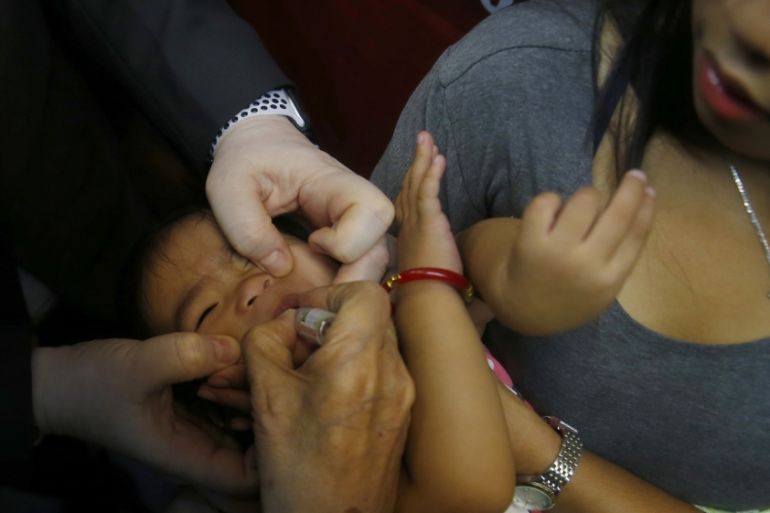Red Cross alarm over polio outbreak in Philippines after 19 years
Humanitarian group warns as many as 11 million Filipino children under five face a risk of death or disability.

The International Red Cross and its Philippine affiliate have warned of an “alarming comeback” of the polio virus in the country, prompting the government to declare a national outbreak.
The humanitarian group said in a statement on Wednesday that it is “scaling up” its efforts in the Philippines to help contain the highly infectious disease, which was declared eradicated in the country 19 years ago.
Keep reading
list of 4 itemsCould a bird flu pandemic spread to humans?
Family says al-Shifa doctor was tortured to death in Israeli prison
Measles outbreak kills at least 42 people in northeast Nigeria
Chris Staines, head of the International Federation of Red Cross and Red Crescent Societies (IFRC) in the Philippines, said as many as 11 million Filipino children under the age of five face a “high risk of disability and even death” because of the virus.
|
|
“We appeal to all parents to protect their children against the virus during this massive, synchronised nationwide campaign,” Staines said.
“The Philippines has eradicated polio before, and together we can do it again.”
In mid-September, the Philippines health department reported that a three-year-old girl and a five-year-old boy tested positive for polio – the first confirmed case since 2000.
A single case of polio requires the government to automatically declare an outbreak.
The polio virus was also detected in sewage in the capital Manila and the waterways in the city of Davao, the hometown of President Rodrigo Duterte.
Following the report, the World Health Organization (WHO) warned that the country risks more cases of polio unless it sharply steps up its vaccination of children under the age of five.
3 out of 5 children not vaccinated
Polio is mainly transmitted by food, water or hands contaminated with human faeces containing the virus, so good hygiene is vital, the WHO said.
The disease, which has no cure, can be prevented with multiple doses of a safe and effective vaccine. More than two billion children globally are protected against polio through these vaccines, the organisation added.
Low immunisation rates have contributed to the outbreak, according to the Red Cross.
|
|
Immunisation coverage in the Philippines for oral polio vaccines is 66 percent but needs to be at 95 percent, WHO’s Philippines representative Rabindra Abeyasinghe said.
So far, only 40 percent of children under the age of five have received a polio vaccine by injection. That means three out of five children under five have not been vaccinated.
Richard Gordon, a Duterte ally and chairman of the Philippines Red Cross, said in a statement that local chapters of the organisation are being mobilised to help in the mass polio vaccination campaign targeting as many as 1.2 million children.
The IFRC has released $336,700 (17.5m pesos) from its disaster relief fund to support the campaign in the southern island of Mindanao and the Metro Manila area.
Past vaccine controversy
The Duterte administration has been criticised for its botched response to a dengue vaccine controversy in 2017, which observers said worried many parents who refused to have their children vaccinated for dengue, among other viruses.
In 2017, the Duterte administration banned the dengue vaccine, Dengvaxia, after its French manufacturer reported that it may not be effective in some cases and could lead to severe dengue infections in some individuals who had not previously had the disease.
The polio outbreak is the third health emergency this year in the Philippines.
In February, a measles outbreak hit the country, and as of May 2019, there were an estimated 477 deaths reported, mostly young children.
It was followed by the dengue outbreak, which infected 271,480 from January to August 31 this year, and killed at least 1,107 people.